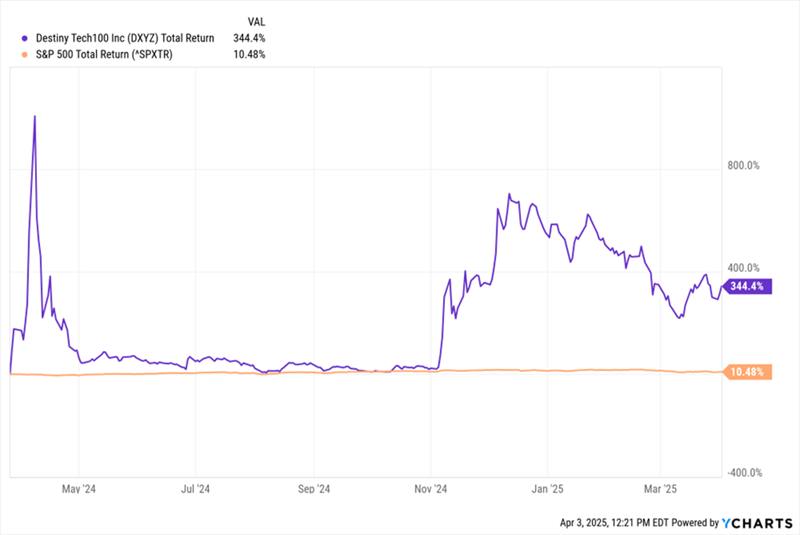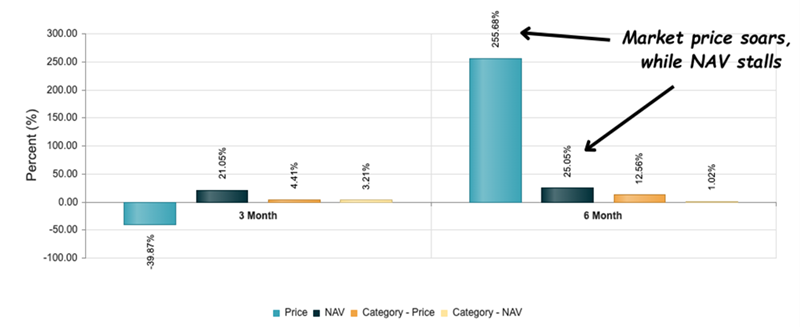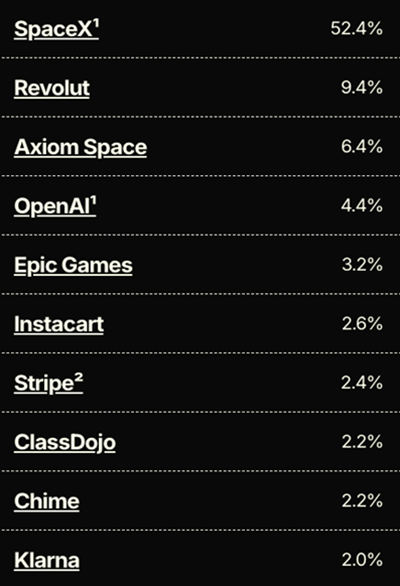I often talk about high-yielding closed-end funds (CEFs) that are great buys because, well, there are plenty of CEFs that are. Yes, even in unprecedented times like these!
That’s because the best CEFs offer three things we love:
- Big dividends, with an average yield of 7.8% across the asset class.
- Bargain valuations, with average discounts to net asset value (NAV, or the value of a CEF’s underlying portfolio) of 5%.
And how’s this for a stat …
- Proven performance, with 94% of CEFs posting positive returns (with dividends reinvested) over the last decade. Ninety. Four. Percent.
Still, every once in a while, a CEF comes across my desk that’s an obvious one to sell (or avoid if you don’t already hold it). It pays to look into overly risky CEFs like these because they can teach us a lot about what to look for, and what to stay well away from, when analyzing these (typically) high-yielding income plays.
With that in mind, there’s one fund out there right now that every investor should avoid unless, like Austin Powers, Danger is your middle name.
That would be a closed-end fund called the Destiny Tech100 Fund (NYSE:DXYZ). Now right off the top, you might wonder why I’m panning DXYZ, after the fund returned 344% since its inception a little over a year ago:
DXYZ Soars—But We’re NOT Buying

Let’s get into why this one should be nowhere near your portfolio today.
For starters, as you can probably tell from the name, DXYZ focuses on tech. But almost all of the fund’s performance has come from its market price appreciating.
That’s important because with CEFs, we have to consider the performance of both the market price and the underlying portfolio, because the two can be quite different. And if you look at DXYZ’s total NAV return (the return of its underlying portfolio, in other words) over the last six months, we can see that its NAV has risen just 25.1%, while its market price has shot up a lot more, according to the CEF Connect fund screener.
Gains From Price, Not Performance

Source: CEF Connect
In other words, almost all of the fund’s gains are coming from its premium to its intrinsic value. This is a danger sign because DXYZ trades at a 512% premium to NAV as I write, again according to CEF Connect. That’s not a typo.
To put this in perspective, the second-largest premium for a publicly traded CEF is the 91% premium on the Abrdn Global Income Fund Inc (NYSE:FCO). And even that premium is in the stratosphere because, as I mentioned a second ago, the average CEF trades at a 5% discount. So DXYZ’s premium is, simply put, absurd.
Now, there are more details to consider here. For one, DXYZ doesn’t report its net asset value daily, as almost all other CEFs do. That’s another concern for investors.
Management would probably respond that this criticism is unfair because DXYZ invests in a lot of private equity. And that response is fair: Private assets tend to get marked to market infrequently, so there just isn’t a daily change in the price. But the fund could still report its NAV daily, since it does hold some common and preferred shares, and the price of those do fluctuate daily.
But the bigger concern is the overall decline we’ve seen in publicly traded US stocks this year, along with an increase in volatility.
While I remain bullish on stocks (and stock-focused CEFs) in the long term, I am worried about more volatility in the short term. That’s a poor setup for DXYZ’s heavy focus on private tech companies because it means less liquidity for those private investments. That, in turn, means less cash for private-equity investors. Which means we’re likely to see more markdowns of these assets.
None of this is good for DXYZ’s approach to markets.
And there’s another risk the fund is not pricing in: Elon Musk.
DXYZ Is a Heavy Investor in SpaceX

Source: Destiny XYZ Inc.
This is not at all a political statement, but simply a fact: Elon Musk is controversial. I likely don’t have to tell you that this is being priced into shares of Tesla (NASDAQ:TSLA) now.
SpaceX hasn’t priced in the Musk factor because, again, private companies aren’t revalued often. And one could argue that SpaceX, which depends on government contracts, stands to benefit from Musk’s close relationship to President Trump.
Of course, Trump won’t be president forever, and the market will likely react when his term is nearing an end. With DXYZ so heavily weighted toward SpaceX, that’s when the fund could see its premium evaporate.
Or its premium could disappear earlier if Trump and Musk were to have a falling out, say. Or if Musk’s relationship to Trump is already priced into SpaceX and the economic benefit of that relationship turns out to be less than the market thinks.
There are a lot of risky “ifs” in this fund right now! All of this means it surely does not deserve the biggest premium, by a huge margin, in the CEF world. And there’s more.
DXYZ, you see, pays no dividend while, as mentioned a second ago, the average CEF yields nearly 8%. Other CEFs with large investments in private companies have outsized income streams, like the 16.2% yield on the BlackRock (NYSE:BLK) Technology and Private Equity Term Trust (NYSE:BTX). BTX also trades at a 5.8% discount to NAV.
DXYZ’s other holdings entail high risk, too: Axiom Space has been financially struggling for months, UK-based Revolut is growing profits nicely, but the British economy is showing weakness.
On average, DXYZ’s investments are losing money, and the market value of those holdings will eventually reflect that if these companies don’t start making a profit.
Finally, let’s do some quick math. At a 512% premium to NAV, as of this writing, there’s a risk of an 84% decline in the fund’s market price for it to reach par. And, again, remember that the average CEF trades at a discount right now. When there’s a market panic, CEF premiums tend to evaporate, so this isn’t a hollow risk.
The bottom line here is that DXYZ is one of the riskiest CEFs out there, if not the riskiest. There’s no reason to expose ourselves to that risk when we’ve got many other top-quality CEFs to choose from that yield 8% and more. And we can get those at a discount, too.
***
Disclosure: Brett Owens and Michael Foster are contrarian income investors who look for undervalued stocks/funds across the U.S. markets. Click here to learn how to profit from their strategies in the latest report, "7 Great Dividend Growth Stocks for a Secure Retirement."
